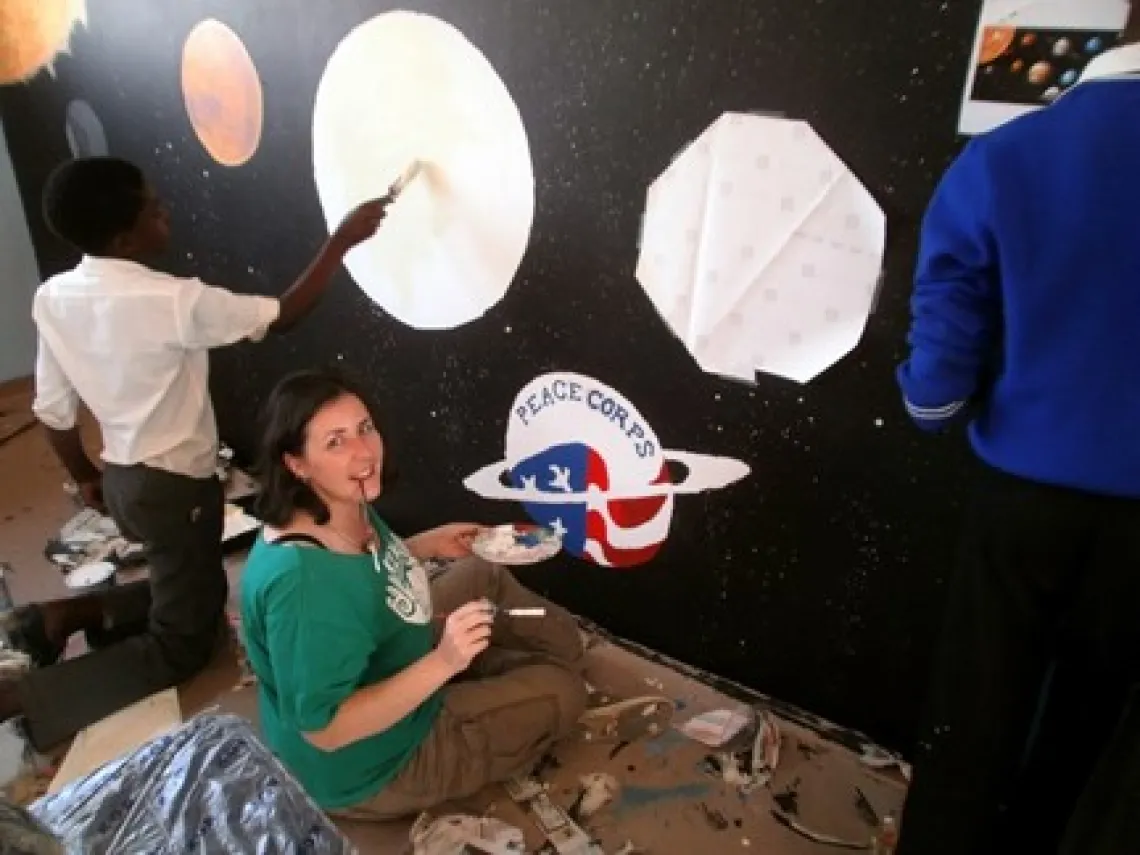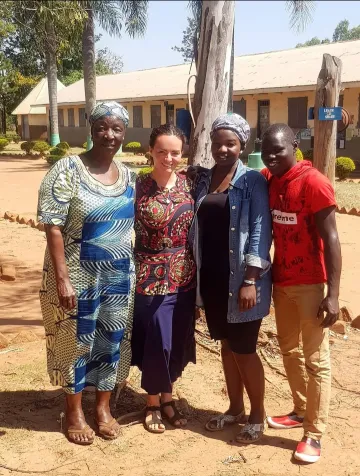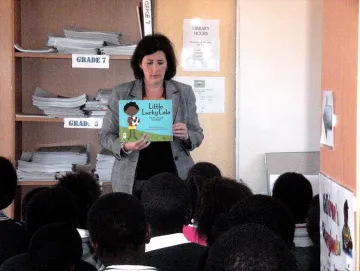Returned Peace Corps Volunteers (RPCVs) share perspectives on Human Rights Practice
Connecting Peace Corps service and the study of human rights at the University of Arizona

Human Rights Practice Alumna and RPCV Robin Al-haddad and students painting space-themed mural in the new Literacy Centre and library at Mawewe High School in South Africa.
At the University of Arizona's fully-online Human Rights Practice Program, we are proud to include among our number several Returned Peace Corps Volunteers (RPCVs). In this article, some of these RPCVs share some perspectives and insights about the connections between Peace Corps service and the field of Human Rights Practice.
On our website, you can learn more about the Human Rights Practice MA and Certificate as well as our specialized Graduate Certificates on Gender-Based Violence; Human Rights and Documentary Media; and Human Rights and Technology. There's also information about how to apply. In addition, you can also read more about the robust community of RPCVs at the University of Arizona. And students in our undergraduate courses are also eligible to participate in Peace Corps Prep.
The participants below, and their locations of Peace Corps service, are: current Human Rights Practice M.A. students Kayla Mitchell (Uganda) and Molly Vines (Senegal); MA alumna Robin Al-haddad (South Africa); and faculty member Prof. Beverly Seckinger (Morocco).
How do you see Peace Corps service relating to the field of Human Rights Practice?
Kayla Mitchell: My service in Uganda related a lot to Human Rights Practice for the simple fact that as volunteers, we were there to serve the community, to share our passion, skills, and dedication to doing all that we can in the community we were placed in. The Peace Corps stays up to date with current human rights issues and we are trained accordingly. Every human being should be treated with dignity and respect, and as volunteers, we are to uphold those values at all times. (Read more about Kayla's experiences as a Human Rights Practice student.)
Prof. Beverly Seckinger: I often think of the Human Rights Practice program as almost an extension of my Peace Corps experience, with its focus on hands-on practice, international collaboration, the interdisciplinary backgrounds of students and faculty alike, and frankly the idealism and commitment of everyone involved. As Margaret Mead said: “Never doubt that a small group of thoughtful, committed citizens can change the world; indeed, it’s the only thing that ever has.” Or to paraphrase human rights filmmakers Pamela Yates and Paco de Onis, we are each contributing our granito de arena, our grain of sand, to making the world a better place. It feels good to be part of this program.
Robin Al-haddad: Peace Corps prioritizes a grassroots and participatory approach to development, with volunteers required to live and work within the community that they serve. Additionally, PCVs are required to work with local counterparts to improve the sustainability of projects and to help build the capacity of local community members. Similarly, the key principles of the human rights approach are participation, accountability, non-discrimination and equality, empowerment, and legality. While Peace Corps volunteers aim to empower local communities to lead in their own development, similarly human rights practitioners seek to empower people to know and claim their rights and to participate in shaping the decisions that impact their human rights.
Molly Vines: While my time in Senegal was short [due to COVID-19 evacuations], I was overwhelmed by the strength and kindness shown to me by the Senegalese people. Between our cultural facilitators, host families, and friendly locals, I was treated as a part of the community and embraced by the host family that took care of me. The Human Rights Practice Program taught me about community-based participatory action which I think is crucial to having a lasting impact.
How can RPCVs benefit from the Human Rights Practice program at the University of Arizona?

Kayla Mitchell with language host family in Uganda.
Prof. Beverly Seckinger: I think RPCVs are a natural fit for our program. They bring recent international experience, have faced and surmounted innumerable challenges, worked collaboratively with people of diverse backgrounds, and are ready to supplement that experience with cutting-edge coursework that will prepare them for greater responsibilities as their careers progress. They will also expand their networks through getting to know the diverse participants in the program (students, faculty, guest presenters) and learn about all kinds of inspiring initiatives underway on multiple continents.
Robin Al-haddad: Post-service, many RPCVs go into humanitarian and international development fields. When working in these fields, particularly when working with marginalized and vulnerable communities or with populations affected by exclusionary policies or those who have suffered from gross human rights violations, it is important to have a basic understanding of the core human rights principles. The Human Rights Practice program at the UA teaches a practical application of the core human rights principles, critical perspectives, and essential skills needed for working in these fields. Additionally, having a better understanding of human rights principles like participation, transparency, non-discrimination, and accountability to affected populations provides a crucial framework to better serve marginalized communities more effectively.
Molly Vines: I believe that RPCVs could benefit from Human Rights Practice at UA because the program combines a historical, political, and culturally competent lens to explore the issues that Peace Corps volunteers experience. In addition, the diversity fostered within the Human Rights Practice program offers a fuller perspective.
Kayla Mitchell: I have gained valuable and insightful education from the HRTS program. I am able to connect many of my classes and assignments to the experiences that I gained as a Peace Corps Volunteer in Uganda. I could not have chosen a better M.A. program to continue my passion and education with!
Could you tell us a bit more about your Peace Corps experience and what you gained from it?

Robin reads a book in the library with Grade 5 students during weekly English literacy lessons.
Kayla Mitchell: I was in the education sector in the northern part of Uganda. I taught English Literacy to grades P1, P2, P4, and P7 with up to 130 students in each class. My side projects consisted of the library/office renovation and coordinating a community event that involved local government officials, parents, teachers, and students. I gained valuable insights on how to immerse myself in the local culture, speak the local language, and classroom management, among many others. Ultimately, I learned to be a tool to help the community in every way possible while upholding Peace Corps values.
Prof. Beverly Seckinger: The time I spent in the Peace Corps in Morocco was absolutely transformative. Immediately after completing my BA in English and French, I spent a summer of intensive teacher training and Arabic study in Rabat before being assigned to teach English as a Foreign Language (TEFL) to Moroccan high school students, spending one year in a small village and then the second year in a nearby town of 100,000. It was trial by fire for me and my two PCV housemates -- the first American women ever to live in Tahala. Every day was an adventure, not only at school but just living in the village: learning to function in dialectal Arabic after only eight weeks of language training, getting to know our neighbors, shopping at the souk, figuring out our place in the community and what we could contribute. It was an incredible learning experience.
Robin Al-haddad: I served as a Peace Corps volunteer in the Republic of South Africa from 2010-2012, where I worked as a Schools and Community Resource Specialist teaching English literacy to underprivileged youth. My husband Woody and I worked together in three rural schools to build the capacity of teachers and school management staff through supporting educators in lesson planning, delivery, addressing content gaps and strengthening teaching practices, etc. While my husband focused on mathematics and computer literacy, I worked to improve English literacy by developing course curriculum and teaching weekly English literacy lessons (Grades 3 through 7) in two resource-poor primary schools. I worked closely with over 50 educators and school management staff at three different schools to strengthen current teaching practices. Additionally, we worked to expanded access to information for high school students through grant writing to raise funds to build and stock a library and Literacy Centre. About a year into my service, as a secondary project, my husband and I began working with our community to create a sewing class to help community members produce handmade sewn clothing, accessories, and toys for sale.
Molly Vines: I arrived in Senegal in February of 2020 and unfortunately was evacuated four weeks later because of COVID-19. During the month that I stayed in Senegal, we stayed at the training center and with host families, learning local languages, customs, and attempting to integrate into the culture. During this month in Senegal, I learned a lot about the healthcare system, how religious and community restrictions limit access to healthcare, how the positionality of women in society has direct impacts on health, the universality of violence, and was introduced to several other issues that limit the safety and protections of women and children

